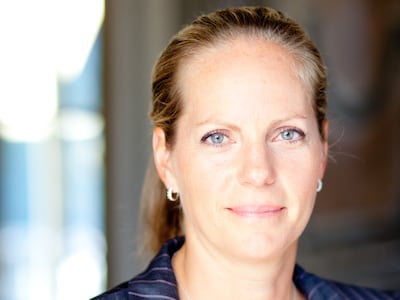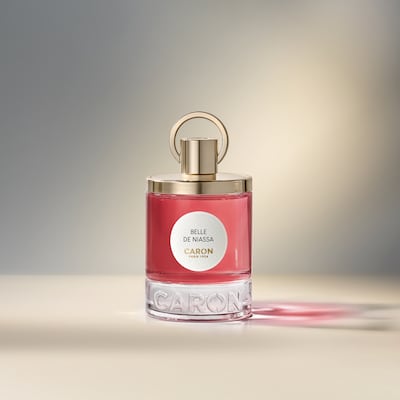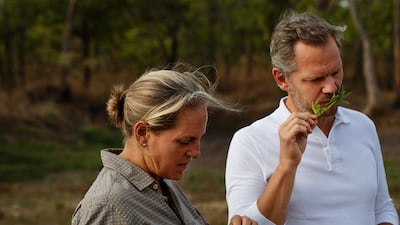Ariane de Rothschild dislikes labels. Then again, even if you tried, it would be impossible to fit her neatly into just one box – baroness, mother, banker, chairwoman – her list of credentials is as long as it is impressive.
In 2018, she added another, unexpected, title to that list – perfumer. When de Rothschild made the decision to acquire perfume house Caron, it set the stage for the merging of two French powerhouses.
“The Rothschilds have been entrepreneurs for more than 250 years and have always ensured that, through our activities, we pass on something greater to future generations,” she says. “With Caron, this means working to transform an iconic brand, with an already strong personality, by reviving its heritage and committing to the future of sustainable luxury.”
Not only did the timing of the acquisition feel serendipitous, the world of perfume had always been an alluring one for de Rothschild. Born in El Salvador to a German father and French mother, she grew up between Colombia, Bangladesh and Belgian Congo, taking in the sights, sounds and smells of each new culture.
“Having spent most of my childhood abroad, I have developed a very personal relationship with the world of perfumes,” she says. “Caron is a house with which I share many values: the preservation of know-how, the search for excellence, the pioneering spirit, and the search for impact on the world. All of this resonates particularly to me. Having the privilege to revive it through a bold entrepreneurial project and perpetuate this incredible savoir faire certainly piqued my interest.”
Ariane may not have been born into the Rothschild family, owners of one of Europe’s largest banking dynasties, but after marrying the late Benjamin de Rothschild in 1999, she made her impact felt across all facets of the family business.

Not only is she president of the French branch of the family’s Edmond de Rothschild private bank, she is also asset manager and chair of its foundations and heritage brand, overseeing everything from grand properties to vineyards, and now, Caron.
“My decision to acquire Caron was driven by my affection for this century-old luxury house with a unique heritage and savoir faire,” she says. “It has been an incredible journey of discovery and I’ve loved every minute. From its inception, the House of Caron has been wildly modern, with all the creations breaking the codes. It’s been amazing to continue this legacy while still paying homage to the brand’s heritage.”
That heritage dates back to 1904, when founder Ernest Daltroff opened his first boutique in Paris. Shortly afterwards, the self-taught perfumer met Felicie Wanpouille, who became his muse and eventual business partner, and together, they created several category-defining scents, from Narcisse Noir to N’Aimez Que Moi.
Through two world wars, Caron’s popularity endured, but towards the turn of the 21st century, fragrance offerings from French luxury houses such as Chanel and YSL reigned supreme.
With de Rothschild at the helm, Caron’s revival is now building on that heritage to attract a new generation of customers. “Caron is a house of creation, and its independence protects its freedom. With no need to follow trends, we set the agenda,” she says.
“It has always had an historic boldness. For example, Pour Un Homme de Caron, which is now an iconic fragrance, was a revolution in perfumery when it was created in 1934. This was the very first fragrance for men that had the audacity to meld lavender, a traditional men’s fragrance ingredient, with vanilla, more associated with feminine scents. My vision is certainly coming to life as we continue to create powerful scents with strong personalities.”
Belle De Niassa is Caron’s latest fragrance, and was launched globally in Dubai in March. Created together with the brand’s in-house perfumer Jean Jacques, who de Rothschild brought in shortly after the acquisition, the scent is inspired by de Rothschild’s time spent in Niassa, Mozambique, and uses essence of the mahogany flower.
“Jean Jacques’s expertise and artistic vision enables us to have a total freedom of creation, respectful of the olfactive DNA of the house, while anchoring it in modernity,” she says. “He enables us to source rare, beautiful and sustainable ingredients that ensure the authenticity of our fragrances.
“This fragrance represents a true innovation as, for the first time in perfumery, the scent of the mahogany flower is showcased in a sumptuous soliflore fragrance,” she adds. “This unique exercise also testifies to Caron’s curiosity and openness to the world.”

In 2021, Caron made the Middle East a priority market, relaunching in the UAE through regional partners Galeries Lafayette Dubai and Perfumery & Co. “Caron has always had strong links with Middle Eastern clientele, either here or in the Paris boutique.
“We are now glad to count 43 counters in the most important and prestigious department stores of six countries: UAE, Saudi Arabia, Qatar, Kuwait, Bahrain and Jordan,” she says. “Launching Belle de Niassa in Dubai as a global preview was a way to testify to the special ties we have with the region.”
Together with Jacques, and now the help of her youngest daughter Olivia, who has joined Caron and helped redesign the perfumes’ famous bottles, de Rothschild plans to continue Caron’s revitalisation, keeping its innovate heritage at the forefront.
“Feeling connected to an iconic brand like Caron offers a delightful soupcon of luxury by simply donning a fragrance,” she says. “Ultimately, luxury can be stripped back to whether it makes one feel amazing and I love that Caron hits all the right notes.”


